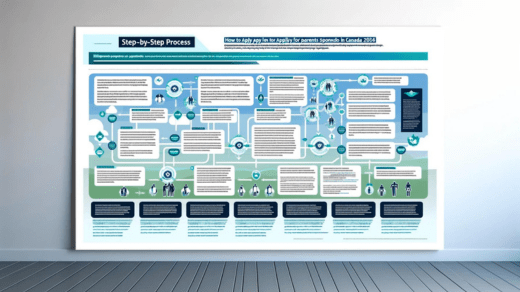Step-By-Step Process: How To Apply For Parents Sponsorship In Canada 2024

In order to simplify the complexities of the Canadian Parent and Grandparent Program (PGP) for Canadian citizens and permanent residents who are eager to sponsor their parents or grandparents, we have brought you this special guide. This guide meticulously details every phase, from the initial application submission to the moment of receiving final approval.
1. Check Your Eligibility:
As a sponsor, your Canadian citizenship or permanent resident status is just the beginning. You’ll navigate the complex matrix of income requirements, a dynamic criterion that fluctuates based on the number of family members you’re pledging to support and your family size.
Your relationship with the sponsored person must be established through blood or legal adoption, and they must successfully navigate the hurdles of medical exams and background checks.
2. Submit The Interest To Sponsor Form:
This initial foray into the application process is more than just a formality. It’s a detailed dossier of your narrative – capturing names, dates of birth, and intricate family details. This stage stands as a crucial gateway to your parents sponsorship Canada 2024 and onwards, with every piece of information potentially pivoting your path forward.
Please note, IRCC has not accepted interest to sponsor forms since 2020. It is not known when they will accept them once again.
3. Receive An Invitation To Apply:
Here, fate plays its hand. If fortune smiles upon you in the random draw, the coveted invitation to apply marks a significant milestone. This juncture is steeped in anticipation, demanding vigilance for notification via email or official channels.
4. Meet The Income Requirements:
Demonstrating financial stability can be complicated. It demands a retrospective glance at your financial odyssey over the last three tax years. The Canada Revenue Agency’s Notices of Assessment become your financial chronicles, echoing your economic journey. These requirements necessitate a keen eye on the latest governmental directives.
5. Prepare And Submit The Application:
Post-invitation, embark on a meticulous documentation odyssey. The ensemble of financial documents, biometrics, and police certificates for your sponsored kin becomes a testament to your commitment. Filling out the application is akin to crafting a narrative – one that demands precision and clarity to avoid the dilemma of delays.
6. Biometrics Collection:
This step transcends mere formality and is an integral security measure. Sponsors and dependents contribute fingerprints and photographs to a digital tapestry of identification.
7. Medical Exams And Police Certificates:
The medical and moral fabric of the sponsored individuals is scrutinised to uphold the health and security of the Canadian populace. Adult applicants weave through the process of obtaining police certificates, ensuring their compatibility with Canadian societal norms.
8. Application Review And Decision:
In this phase, the IRCC team thoroughly analyses your application. Each application undergoes a unique assessment process, leading to varying timelines for each applicant. This variability underscores the IRCC‘s detailed and individualised approach to evaluating applications.
9. Sponsorship Agreement:
One of the key documents in this process is the sponsorship agreement. It creates a formal agreement between the person sponsoring and the one being sponsored. This agreement includes important details about the financial support the sponsor must provide over a long period.
10. Prepare For Arrival:
The approval heralds a new phase – it is about bringing parents to Canada. This stage involves more than just logistical arrangements; it’s about laying the groundwork for their new life in Canada, encompassing housing, healthcare, and social integration.
Alternatives to PGP
The Super Visa program emerges as a beacon of hope for those navigating the PGP’s complexities. It offers a less permanent yet profoundly meaningful opportunity for families to reunite.
This program permits extended, multi-year visits, providing a tapestry of memories and experiences for Canadian residents and their overseas parents or grandparents.



